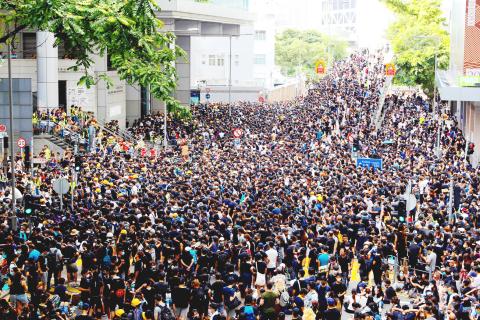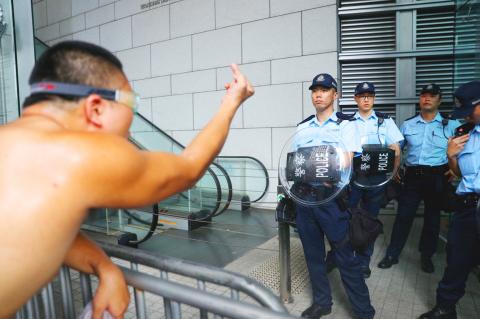Thousands of protesters yesterday evening blockaded the Hong Kong police headquarters, demanding the resignation of the territory’s pro-Beijing leader and the release of demonstrators arrested during Hong Kong’s worst political crisis in decades.
The latest protest comes after the government refused to meet the demands of demonstrators who have marched in their millions to oppose a bill that would allow extraditions to the mainland.
Opposition groups, after putting on the biggest political rallies in Hong Kong’s history, have called for the complete withdrawal of the extradition legislation and for Hong Kong Chief Executive Carrie Lam (林鄭月娥) to step down, but the movement has also morphed into a wider expression of public anger at Lam and leaders in Beijing after years of sliding political freedoms.

Photo: AP
Throughout yesterday the predominantly young, leaderless protesters used spontaneity and movement to up the pressure on authorities.
Peaceful civil disobedience was used across key parts of the territory’s commercial district, with a main roadway seized and two government offices briefly blocked, but the focus for the day and into the evening was police headquarters, where thousands gathered, many chanting “release the righteous” and “shame on police thugs” — references to those detained during violence last week between demonstrators and the police.
Anger toward the police force has exploded since officers on Wednesday last week used rubber bullets and tear gas to clear crowds of protesters from the streets.

Photo: EPA-EFE
Opposition groups have demanded an investigation into allegations of police brutality and the release of those detained during the clashes, in addition to Lam’s ouster and a cancelation of the extradition bill.
Rights group Amnesty International yesterday said that it had verified multiple instances of police violence that breached international laws, while the Hong Kong Bar Association added its voice to calls for an investigation into police tactics.
Crowds outside police headquarters grew in the evening as workers joined the largely student-led protest, where demonstrators used metal barricades to fortify their positions, and used unfurled umbrellas and masking tape to obscure CCTV cameras.
Police held back from any response, and with the exception of a few thrown eggs, the demonstration remained peaceful.
Earlier in the day, smaller groups of protesters briefly blocked the entrances to the nearby immigration and revenue departments.
“We need to flow like water,” to be able to retreat and regroup and adapt, said protester Chris, referencing a famous quote from martial arts superstar and Hong Kong legend Bruce Lee (李小龍).
Another protester likened the crowds to artificial intelligence.
“They learn from themselves, nobody really teaches them, they just adapt to different situations,” said Bernard, 21.
The call for the demonstration was made by student unions, as well as informal organizers over social media apps such as Telegram.
“Blossom everywhere,” read a statement circulated on Thursday in a Telegram chat group.
Lam has so far defied calls to step down, and while she has apologized and suspended the bill indefinitely, it has failed to quell anger.
Pro-democracy demonstrators have vowed to hold another mass rally on July 1.
Opponents of the extradition bill fear it will ensnare Hong Kongers in China’s opaque and politicized justice system, and also give Beijing a tool to target critics based in the semi-autonomous territory.
Separately yesterday, former Philippine secretary of foreign affairs Albert del Rosario — a critic of China’s claims in the disputed South China Sea — was denied entry to Hong Kong and deported, his lawyer said, adding that he was not given a reason for the expulsion.
Hong Kong immigration authorities did not immediately respond to a request for comment.

Right-wing political scientist Laura Fernandez on Sunday won Costa Rica’s presidential election by a landslide, after promising to crack down on rising violence linked to the cocaine trade. Fernandez’s nearest rival, economist Alvaro Ramos, conceded defeat as results showed the ruling party far exceeding the threshold of 40 percent needed to avoid a runoff. With 94 percent of polling stations counted, the political heir of outgoing Costa Rican President Rodrigo Chaves had captured 48.3 percent of the vote compared with Ramos’ 33.4 percent, the Supreme Electoral Tribunal said. As soon as the first results were announced, members of Fernandez’s Sovereign People’s Party

MORE RESPONSIBILITY: Draftees would be expected to fight alongside professional soldiers, likely requiring the transformation of some training brigades into combat units The armed forces are to start incorporating new conscripts into combined arms brigades this year to enhance combat readiness, the Executive Yuan’s latest policy report said. The new policy would affect Taiwanese men entering the military for their compulsory service, which was extended to one year under reforms by then-president Tsai Ing-wen (蔡英文) in 2022. The conscripts would be trained to operate machine guns, uncrewed aerial vehicles, anti-tank guided missile launchers and Stinger air defense systems, the report said, adding that the basic training would be lengthened to eight weeks. After basic training, conscripts would be sorted into infantry battalions that would take

GROWING AMBITIONS: The scale and tempo of the operations show that the Strait has become the core theater for China to expand its security interests, the report said Chinese military aircraft incursions around Taiwan have surged nearly 15-fold over the past five years, according to a report released yesterday by the Democratic Progressive Party’s (DPP) Department of China Affairs. Sorties in the Taiwan Strait were previously irregular, totaling 380 in 2020, but have since evolved into routine operations, the report showed. “This demonstrates that the Taiwan Strait has become both the starting point and testing ground for Beijing’s expansionist ambitions,” it said. Driven by military expansionism, China is systematically pursuing actions aimed at altering the regional “status quo,” the department said, adding that Taiwan represents the most critical link in China’s

‘REALLY PROUD’: Nvidia would not be possible without Taiwan, Huang said, adding that TSMC would be increasing its capacity by 100 percent Nvidia Corp CEO Jensen Huang (黃仁勳) on Saturday praised and lightly cajoled his major Taiwanese suppliers to produce more to help power strong demand for artificial intelligence (AI), capping a visit to the country of his birth, where he has been mobbed by adoring fans at every step. Speaking at an impromptu press conference in the rain outside a Taipei restaurant, where he had hosted suppliers for a “trillion-dollar dinner,” named after the market capitalization of those firms attending, Huang said this would be another good year for business. “TSMC needs to work very hard this year because I need a lot